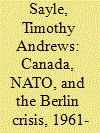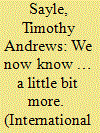| Srl | Item |
| 1 |
ID:
124411


|
|
|
|
|
| Publication |
2013.
|
| Summary/Abstract |
Historians of Canadian foreign affairs have argued that Canada played an important role in influencing allied policy during the Berlin Crisis of 1961-1962. Newly declassified documents reveal the opposite. Canada opposed much of the North Atlantic Treaty Organization (NATO) contingency planning during the crisis, especially plans calling for the demonstrative use of nuclear weapons. Despite Canada's efforts to modify NATO's Berlin Contingency plans (BERCONs), Canadian diplomats found themselves isolated in the North Atlantic Council (NAC) and accepted plans they considered to be dangerous. Canada had no significant influence on NATO military planning during one of the most serious crises of the Cold War.
|
|
|
|
|
|
|
|
|
|
|
|
|
|
|
|
| 2 |
ID:
175629


|
|
|
|
|
| Summary/Abstract |
This articles examines the debate, and sometimes lack of debate, over nuclear issues in NATO from the beginning of the alliance to the mid-1960s and reveals how American officials changed their approach to deal with NATO’s nuclear issues. In the 1950s, US officials released only limited information about nuclear weapons that were a part of NATO’s war plans. Gradually, they determined that some of NATO’s major tensions stemmed from their allies’ lack of information about the extent of the US nuclear arsenal and its intended uses. After several halting steps, Secretary of Defense Robert McNamara decided that US interests could be best met by offering the allies a nuclear education.
|
|
|
|
|
|
|
|
|
|
|
|
|
|
|
|
| 3 |
ID:
179859


|
|
|
|
|
| Summary/Abstract |
Igor Gouzenko’s defection might have been the first—and most famous—of the Cold War in Canada, but it was hardly the last. Recently opened after Access to Information Act requests made by the Canadian Foreign Intelligence History Project, a number of records cast brighter light on this aspect of Canada’s intelligence history. This article offers an overview of how the Government of Canada established its policy to manage defection and those who defected. It offers a number of possible leads for future research projects, some, but not all, of which, will require the release of further material, whether under the Access to Information Act or a broader declassification framework from the Government of Canada.
|
|
|
|
|
|
|
|
|
|
|
|
|
|
|
|